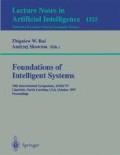Abstract
The known approaches to object specification based on first-order temporal logic fail in capturing the often occurring need to change the dynamic behaviour of a system during lifetime of that system. Usually all possible behaviours have to be described in advance, i.e. at specification time. Therefore, we here present an extension going beyond first-order temporal logic. Now, it becomes possible to specify ways of dynamically changing the behaviour of a system during lifetime. This can be done by giving each object an additional (non-first-order) attribute. The value of this attribute contains a set of first-order formulas being the currently valid behaviour specification. In addition, this approach can easily be extended for introducing a way of default reasoning.
This research has been supported in part by the European Commission through Esprit ModelAge (No. 8319), ASPIRE (No. 22704) and FIREworks (No. 23531).
Preview
Unable to display preview. Download preview PDF.
References
S. Conrad. Compositional Object Specification and Verification. In I. Rozman and M. Pivka, eds., Proc. Int. Conf. on Software Quality (ICSQ'95), Maribor, Slovenia, pp. 55–64, 1995.
S. Conrad. A Basic Calculus for Verifying Properties of Interacting Objects. IEEE Transactions on Knowledge & Data Engineering, 18(2):119–146, 1996.
E. Dubois, P. Du Bois, and M. Petit. O-O Requirements Analysis: An Agent Perspective. In O. Nierstrasz, ed., ECOOP'93-Object-Oriented Programming (Proceedings), pp. 458–481, Springer-Verlag LNCS 707, 1993.
J. Fiadeiro and T. Maibaum. Temporal Reasoning over Deontic Specifications. Journal of Logic and Computation, 1(3):357–395, 1991.
R. B. Feenstra and R. J. Wieringa. LCM 3.0: A Language for Describing Conceptual Models. Technical Report, Faculty of Mathematics and Computer Science, VU Amsterdam, 1993.
R. Jungclaus, G. Saake, T.Hartmann, and C. Sernadas. TROLL-A Language for Object-Oriented Specification of Information Systems. ACM Transactions on Information Systems, 14(2):175–211, 1996.
S. Khosla and T. Maibaum. The Prescription and Description of State Based Systems. In B. Banieqbal, H. Barringer, A. Pnueli, eds., Temporal Logic in Specification, pp. 243–294. Springer-Verlag LNCS 398, 1989.
J. Meseguer. A Logical Theory of Concurrent Objects and Its Realization in the Maude Language. In G. Agha, P. Wegener, A. Yonezawa, eds., Research Directions in Object-Oriented Programming, pp. 314–390. MIT Press, 1993.
G. Saake, S. Conrad, and C. Türker. From Object Specification towards Agent Design. In M. Papazoglou, ed., OOER'95: Object-Oriented and Entity-Relationship Modeling (Proc.), pp. 329–340, Springer-Verlag LNCS 1021, 1995.
A. Sernadas, C. Sernadas, and J. Costa. Object Specification Logic. Journal of Logic and Computation, 5(5):603–630, 1995.
A. Sernadas, C. Sernadas, and H.-D. Ehrich. Object-Oriented Specification of Databases: An Algebraic Approach. In P. M. Stoecker, W. Kent, eds., Proc. 13th Int. Conf. on Very Large Data Bases (VLDB'87), pp. 107–116. VLDB Endowment Press, 1987.
G. Saake, A. Sernadas, and C. Sernadas. Evolving Object Specifications. In R. Wieringa, R. Feenstra, eds., Information Systems-Correctness and Reusability. Selected Papers from the IS-CORE Workshop, pp. 84–99. World Scientific Publ., 1995.
Author information
Authors and Affiliations
Editor information
Rights and permissions
Copyright information
© 1997 Springer-Verlag Berlin Heidelberg
About this paper
Cite this paper
Conrad, S., Saake, G. (1997). Extending temporal logic for capturing evolving behaviour. In: Raś, Z.W., Skowron, A. (eds) Foundations of Intelligent Systems. ISMIS 1997. Lecture Notes in Computer Science, vol 1325. Springer, Berlin, Heidelberg. https://doi.org/10.1007/3-540-63614-5_6
Download citation
DOI: https://doi.org/10.1007/3-540-63614-5_6
Published:
Publisher Name: Springer, Berlin, Heidelberg
Print ISBN: 978-3-540-63614-4
Online ISBN: 978-3-540-69612-4
eBook Packages: Springer Book Archive

